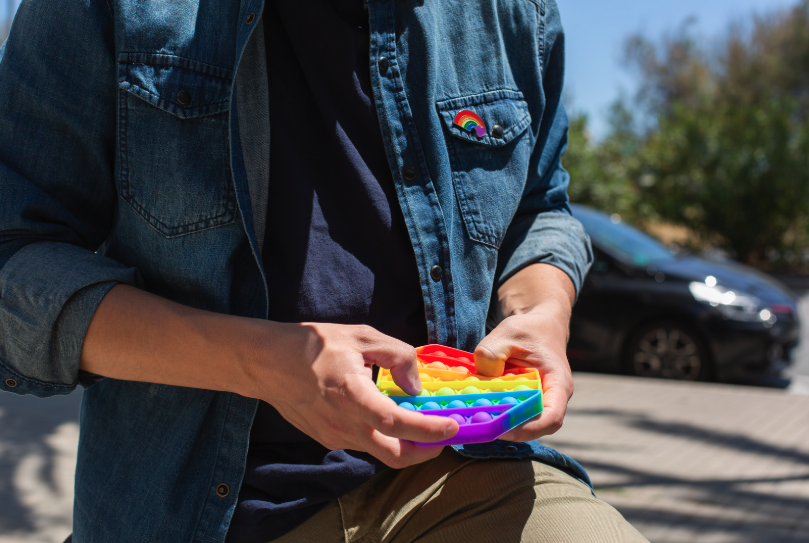Creating a Neurodiversity-Affirming End of Year Event!
TLDR? It’s simple to make your workplace event affirming, and it doesn’t have to cost a thing! Scroll to the bottom for our FREE PDF, summarising this post. As a BONUS, it’s easily printable for your workplace.
Last year, I shared a post on LinkedIn that resonated with many in the Neurodivergent community. In it, I talked about the challenges of navigating end-of-year workplace social events as an Autistic and ADHD person. While I genuinely enjoy seeing my colleagues and catching up, these events often come with a lot of sensory overwhelm and anxiety, which can make it hard to fully participate.
For many Neurodivergent people, these gatherings can feel more exhausting than fun. Instead of enjoying the festivities, they might be hyper-attuned to every little sensory detail: the clinking of cutlery, overlapping conversations, chewing, background music, smells, tastes, textures, and even flickering lights. It’s like the brain is trying to process everything at once, leaving no space to focus on conversation or relax into the moment. On top of that, there’s the added pressure of masking—trying to mimic neurotypical social behaviours just to fit in. This can feel incredibly uncomfortable and often comes at the cost of being able to express yourself or connect authentically with others.
The mental effort involved in masking can be overwhelming. Thoughts race: “What should I say?” “What expression should I make?” “When is it okay to leave without seeming rude?” “Did I overshare about my special interest and bore them?” For many, small talk feels like trying to perform a script they’ve never rehearsed, and the constant self-monitoring drains energy fast. By the time the event is over, it’s not that an Autistic or ADHD person didn’t want to be there or engage—it’s that being there took everything they had.
But last year, I had a completely different experience at a workplace Christmas party. Most of my colleagues were also Autistic and/or ADHD, and being in a group where Neurodivergence was understood and accepted made all the difference. I didn’t feel the need to mask and could just be myself. When the sensory overwhelm became too much, I stepped out for a break and came back with some fidget toys I had in my car. I put them on the table, and they weren’t just accepted, they were a hit! Everyone started using them, and other Neurodivergent people there said they loved having them available.
Later, I pulled out a card game, Spot It, and played with a friend. It gave me a way to have a meaningful interaction without the pressure of small talk. What stood out the most, though, was how accepting everyone was and the difference it made to everyone’s comfort. We were in a formal function space, sitting on the floor playing a game but nobody cared! We weren’t seen as immature or ‘weird.’ Our colleagues understood that we weren’t being ‘rude’ or ‘antisocial’—we were just being ourselves.
That night stuck with me because it showed how much of a difference a Neurodiversity-Affirming environment can make, not just for Autistic and ADHD people, but for everyone. When people feel comfortable being themselves, it makes the whole event more relaxed and enjoyable for all involved!
Thinking back on that experience, I believe there are simple steps workplaces can take to make end-of-year events more inclusive. With just a bit of conscious and deliberate effort, we can create gatherings where Neurodivergent people feel genuinely seen and supported. Here are some key ideas to help make that happen this year!
7 Simple Ways
〰️
7 Simple Ways 〰️
1. Consider Financial Equity in Gift Exchanges
For many Neurodivergent people, financial participation in social events can be a significant challenge. Neurodivergent people are more likely to work part-time due to disability or health needs and, if they’re parents, they may also have children with additional support needs or disabilities. With the current cost-of-living crisis, ensuring gift exchanges like Kris Kringle or Bad Santa are financially accessible is more important than ever.
While $30 might seem like a modest amount for a single gift, the expenses add up quickly when attending multiple events in the lead-up to Christmas. Setting a more realistic price range, or even offering alternative, non-monetary gift ideas, can help reduce financial strain. This approach avoids singling out people who may already feel nervous about facing social judgment. Inclusivity here isn’t about removing the fun, but ensuring no one is excluded or pressured into overextending themselves.
2. Recognise the Impact of Social Burnout
Christmas and New Year often come with an increase in social expectations. This can be especially overwhelming for Neurodivergent people and social burnout is a real challenge. If someone doesn’t stay for the entire event, or doesn’t attend at all, don't assume this means they are being rude or are uninterested. Often, it’s about managing their energy levels and avoiding complete overwhelm.
Creating opportunities for people to join in without committing to the whole event can make a big difference. For example, offering a designated time for a smaller, quieter part of the event, or allowing flexibility for late arrivals or early departures, can help make the experience more accessible for neurodivergent people.
3. Focus on Activities Over Small Talk
While neurotypical people often connect through casual conversation, Neurodivergent people tend to find deeper connection through shared interests or activities. Small talk can feel exhausting and stressful, but engaging in structured activities often provides a more comfortable way to connect and build relationships.
Games, collaborative crafts, or other group activities shift the focus from conversation to a shared experience. In my case, a simple game like Spot It offered a way to connect without the pressure of figuring out what to say or how to navigate social nuances.
Neurodivergent colleagues might even have their own ideas for activities based on their unique interests, which they can bring and share with the group. Incorporating these ideas not only makes the event more inclusive but also creates opportunities for everyone to engage in ways that feel natural and enjoyable.
4. Provide Sensory Tools for Everyone
Sensory tools aren’t just for kids, adults love them too! Placing fidget toys or other sensory items directly on tables makes them easily accessible and helps normalise them. When they’re part of the shared space, people can use them without feeling like they’re standing out. They can also be a good conversation starter and way of connecting with each other.
5. Create a Quiet Space
A quiet space can make a huge difference for Neurodivergent people who might feel overwhelmed by the sensory demands of a large event. A separate area where Neurodivergent people can take a break and recharge offers a chance to step away from the noise, lights, and crowds before returning to the festivities. This simple accommodation can allow people to engage on their terms, making the event more comfortable. Normalising the ability to step in and out as needed can reduce self-consciousness and may help Neurodivergent people stay longer.
6. Communicate Clear Expectations & Details
Uncertainty and surprises can be especially stressful for Autistic people, who often prefer structured, predictable environments. Sharing detailed information ahead of time (like the event’s start time, location, duration, dress code, and activities) can reduce anxiety and help everyone feel more prepared.
If there’s a surprise element planned, consider offering Neurodivergent colleagues the option to request more information discreetly. This way, they can participate without worrying about the unknown, while others can still enjoy the surprise.
7. Respect Boundaries & Non-Attendance Without Judgment
If a Neurodivergent colleague chooses not to attend, it’s important to respect their decision without judgment. Holidays, combined with everyday sensory and social challenges, can be exhausting, and sometimes skipping an event is the healthiest choice they can make.
Knowing boundaries will be respected might even encourage Neurodivergent people to attend future events, especially when they know other accommodations will be in place.
By making workplace events inclusive, we create environments where everyone feels valued and able to participate in a way that works for them. Neurodivergent people bring unique perspectives, strengths, and creativity to the workplace, and when their needs are considered, it benefits the whole team.
In summary:
Inclusion isn’t something that happens once, it’s about consistently recognising and accommodating the different ways people connect and engage. As your end of year events approach, consider making them accessible to all ensure everyone feels welcome. Small, intentional adjustments can make a big difference!
I hope these tips make your celebrations more accessible and enjoyable for everyone. We’ve created a print-friendly PDF that you can circulate as a starting point for this conversation.
A gift for you!
〰️
A gift for you! 〰️
Wishing you all a safe, happy, and relaxing Christmas and New Year!



















